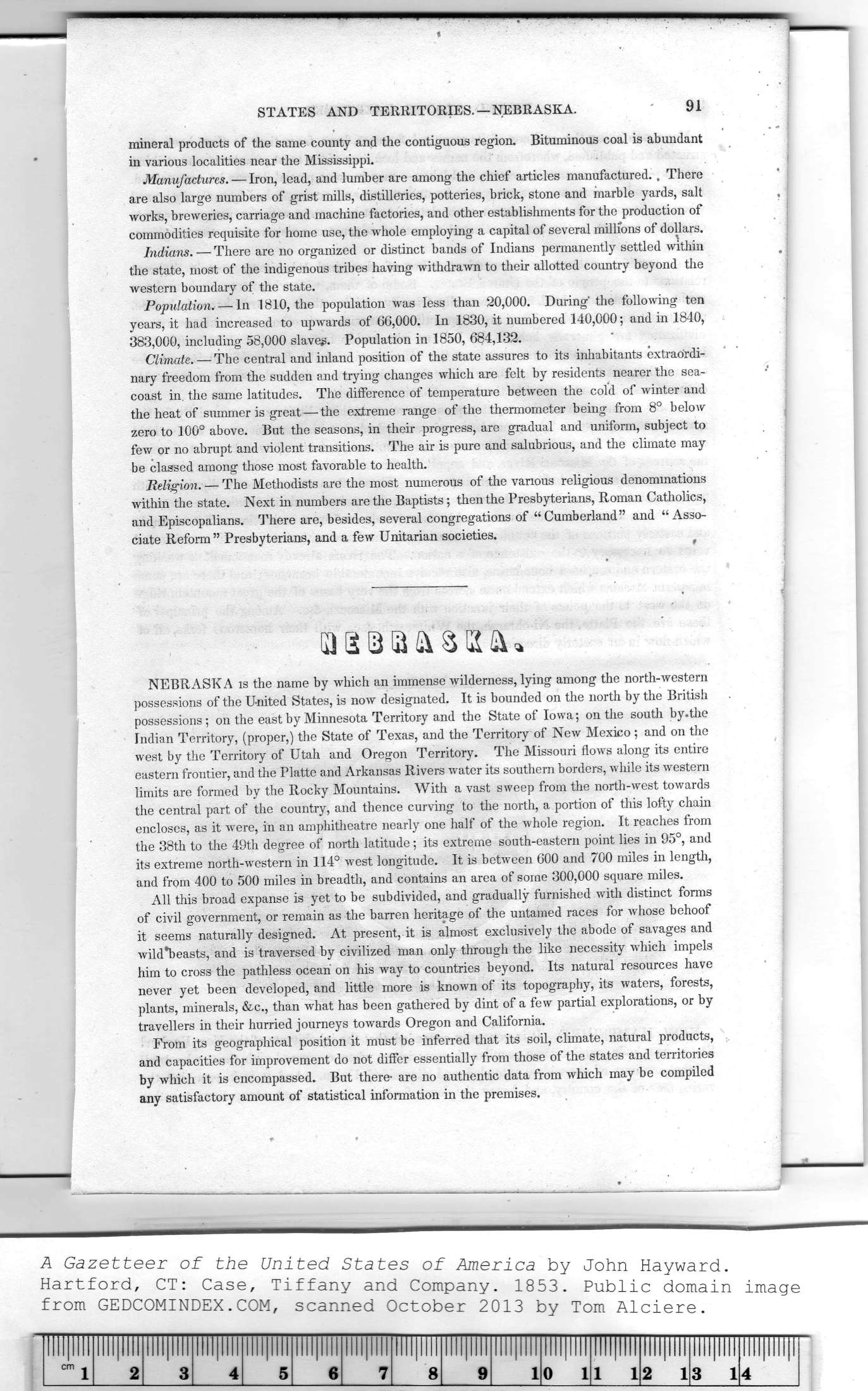|
|
Note: Ctrl and + increases the font size of the text below, Ctrl and - decreases it, and Ctrl and 0 resets it to default size.
STATES AND TERRITORIES.—NEBRASKA. 91
mineral products of the same county and the contiguous region. Bituminous coal is abundant
in various localities near the Mississippi.
Manufactures. — Iron, lead, and lumber are among the chief articles manufactured., There
are also large numbers of grist mills, distilleries, potteries, brick, stone and marble yards, salt
works, breweries, carriage and machine factories, and other establishments for the production of
commodities requisite for home use, the whole employing a capital of several millions of dollars.
Indians. — There are no organized or distinct bands of Indians permanently settled within
the state, most of the indigenous tribes having withdrawn to their allotted country beyond the
western boundary of the state.
Popidation. — In 1810, the population was less than 20,000. During' the following ten
years, it had increased to upwards of 66,000. In 1830, it numbered 140,000; and in 1840,
383,000, including 58,000 slaves. Population in 1850, 684,132.
Climate. — The central and inland position of the state assures to its inhabitants extraordi-
nary freedom from the sudden and trying changes which are felt by residents nearer the sea-
coast in. the same latitudes. The difference of temperature between the cold of winter and
the heat of summer is great — the extreme range of the thermometer being from 8° below
zero to 100° above. But the seasons, in their progress, are gradual and uniform, subject to
few or no abrupt and violent transitions. The air is pure and salubrious, and the climate may
be classed among those most favorable to health.
Religion. — The Methodists are the most numerous of the various religious denommations
within the state. Next in numbers are the Baptists; then the Presbyterians, Roman Catholics,
and Episcopalians. There are, besides, several congregations of “Cumberland" and “Asso-
ciate Reform" Presbyterians, and a few Unitarian societies.
NEBR ASK A is the name by which an immense wilderness, lying among the north-western
possessions of the United States, is now designated. It is bounded on the north by the British
possessions; on the east by Minnesota Territory and the State of Iowa; on the south by.the
Indian Territory, (proper,) the State of Texas, and the Territory of New Mexico ; and on the
west by the Territory of Utah and Oregon Territory. The Missouri flows along its entire
eastern frontier, and the Platte and Arkansas Rivers water its southern borders, while its western
limits are formed by the Rocky Mountains. With a vast sweep from the north-west towards
the central part of the country, and thence curving to the north, a portion of this lofty chain
encloses, as it were, in an amphitheatre nearly one half of the whole region. It reaches from
the 38th to the 49th degree of north latitude; its extreme south-eastern point lies in 95°, and
its extreme north-western in 114° west longitude. It is between 600 and 700 miles in length,
and from 400 to 500 miles in breadth, and contains an area of some 300,000 square miles.
All this broad expanse is yet to be subdivided, and gradually furnished with distinct forms
of civil government, or remain as the barren heritage of the untamed races for whose behoof
it seems naturally designed. At present, it is almost exclusively the abode of savages and
wild*beasts, and is traversed by civilized man only through the like necessity which impels
him to cross the pathless ocean on his way to countries beyond. Its natural resources have
never yet been developed, and little more is known of its topography, its waters, forests,
plants, minerals, &c., than what has been gathered by dint of a few partial explorations, or by
travellers in their hurried journeys towards Oregon and California.
From its geographical position it must be inferred that its soil, climate, natural products,
and capacities for improvement do not differ essentially from those of the states and territories
by which it is encompassed. But there- are no authentic data from which may be compiled
any satisfactory amount of statistical information in the premises.
|
lllllllll |
lllllllll |
lllllllll |
lllllllll |
lllllllll |
lllllllll |
lllllllll |
lllllllll |
lllllllll |
lllllllll |
lllllllll |
lllllllll |
lllllllll |
lllllllll |
llll|l!l!|! |
|
cm j |
2 |
3 |
4 |
5 |
6 |
7 |
8 |
9 |
1 |
0 1 |
1 1 |
2 1 |
3 1 |
4 |
|
